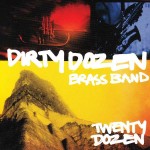The idea for this one was to pick up on the plan for the Dozen’s fifth album back in 1991, Open Up: Whatcha Gonna Do with the Rest of Your Life?, with each member writing his own composition. But after 35 years of life together on and off the road, it’s not easy for the Dozen to do anything simply as individuals. Even those tunes that may carry a single byline inevitably reflect a collaborative process. In fact, the cohesive horn choruses characterize this album, an assembly of ensemble grooves laid down with the precision of master locksmiths and embellished with the full virtuosity of extremely talented, lifetime musicians. From the first crack of steel-pan accents sending off a cascading rhythm of reggae horn choruses, bungee-cord guitar chops, and ocean-size organ swells, you know you’ve landed in a magical land of music, where the funk is the thing and masterful musicianship the only way to get there.
If Twenty Dozen seems unusually vibrant, even for the ever-ready Dozen, it may be because it’s actually the work of veteran musicians luxuriating in their own sense of accomplishment: 35 years of continuous music-making, all of it singular in nature, and now, in full maturity, the band is based on a core of five founding members and drummer Terrence Higgins contributing one of three straight funk tunes that anchor the set: sousaphone guru Kirk Joseph’s “Jook,” trumpeter Gregory Davis’ subtle and upbeat “Git Up,” and Higgins’ powerful “We Gon’ Roll (Down in New Orleans).” These are interlaced with compositions bearing witness to a strong Afro-Caribbean breeze that permeates the entire collection, beginning with trumpeter Efrem Towns’ reggae opener “Tomorrow,” saxophonist Kevin Harris’ Calypso-flavored “Best of All,” Roger Lewis’ masterful, stop-time-punctuated “Trippin’ Inside a Bubble,” built on variants of Latin-inflected beats, and Higgins’ complete overhaul of the Rihanna hit “Don’t Stop the Music,” remaking it as an Afropop, soul-makossa extravaganza.
Those seven tunes are 40 minutes of super-sleek and highly expressive smooth-jazz, instrumental funk. They’re followed by a medley of classic New Orleans street-parade tunes and Roger Lewis’ onstage novelty “(I’m a) Dirty Old Man (and I Feel Like Spankin’ Somebody),”—20 more minutes of music played at the same high level of mastery and enthusiasm, but they detract from what came before. The New Orleans and novelty material is standard Dozen stage fare—never recorded before, it’s true, but still standard fare—while the opening 40 minutes of original compositions on Twenty Dozen constitute a stand-alone portion of some of the most fully realized and most masterfully played original funk/blues/R&B/jazz to emerge from the city where blues and jazz and R&B and funk were, if not born, certainly nurtured. Fulfill the original-composition mandate and this could easily be an achievement approaching cosmic proportions.





